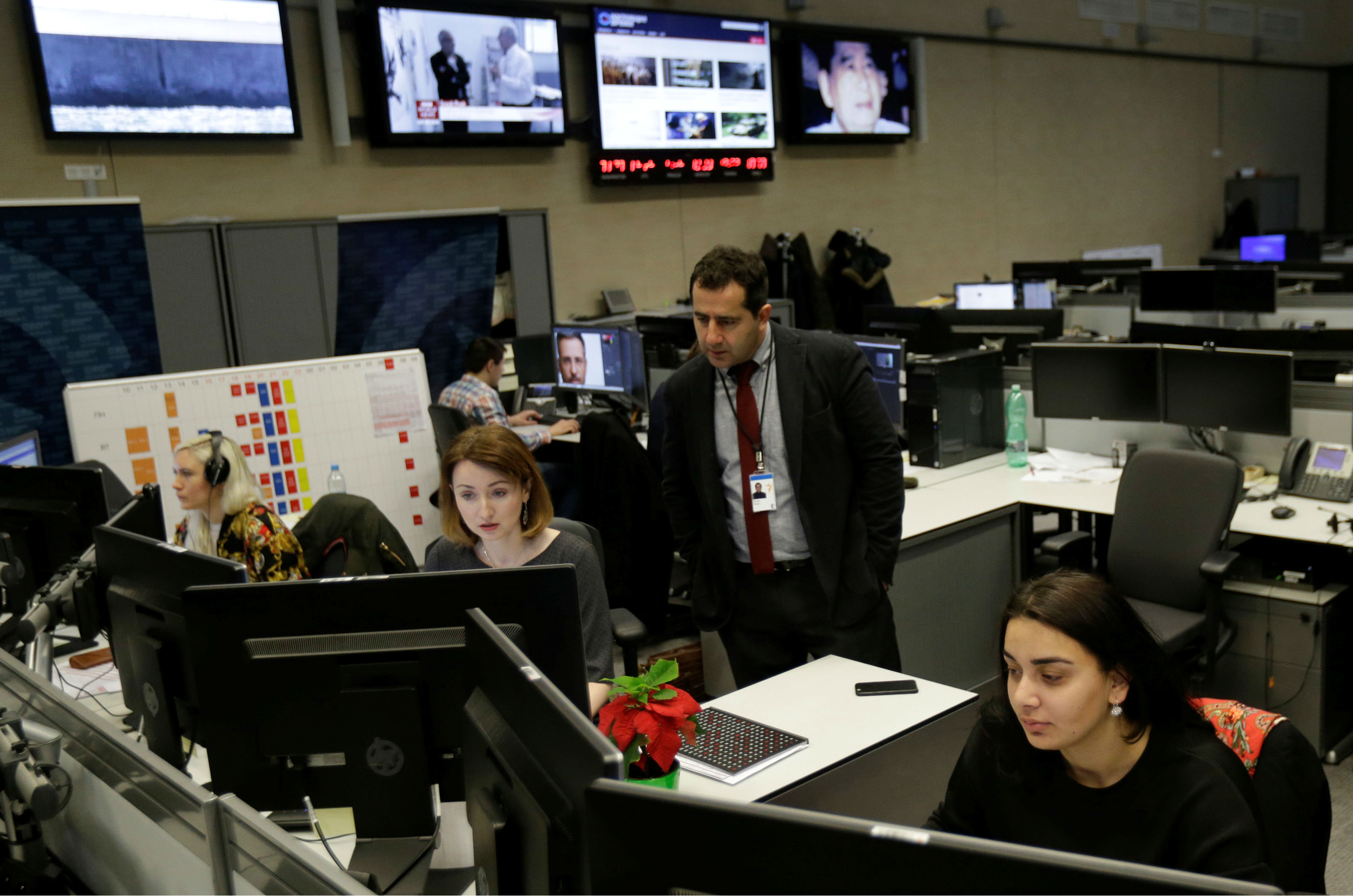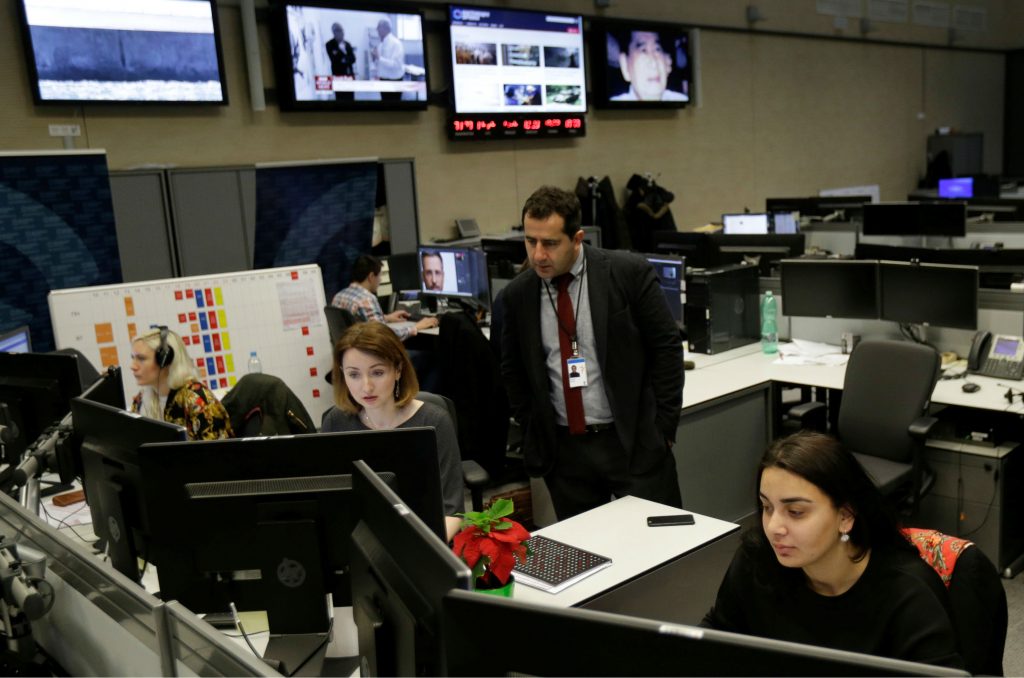 Journalists and activists in Eastern Europe have been fighting modern propaganda for years. It is time to deploy the lessons of those battles to newsrooms in Washington and beyond.
Journalists and activists in Eastern Europe have been fighting modern propaganda for years. It is time to deploy the lessons of those battles to newsrooms in Washington and beyond.
I’ve been exposing organized lies professionally for years now. It started when propaganda took over the Russian-state newsroom in Moscow I was managing in 2013. When I left for Ukraine the same year, I wrongly thought disinformation would be contained in Russia. A year later, propaganda was fueling a brutal war in eastern Ukraine. That’s when disinformation went global.
That was 2014. These days I don’t have to convince anyone that disinformation is a global phenomenon. In the United States, Congress and an independent probe are investigating possible cooperation between the Trump campaign and a state-funded army of Russian social media bots. Eastern Europe was a test ground for the same sort of interference three years ago. UAE reportedly orchestrated hacking of Qatari government sites to provoke a regional crisis? Eastern Europe, three years ago. Poland uses state-run broadcasting to manufacture propaganda in the pursuit of installing an illiberal democracy? Been there, done that three years ago.
The main lesson we’ve learned, and it’s one that many journalists don’t seem to understand, is that disinformation exploits and thrives on the weaknesses of modern journalism. The creators of modern propaganda appreciate good storytelling, bringing light to untold stories and finding global trends in local stories, which creates strong bonds of trust with the audience. These are the same things that make real journalism socially valuable. But these days it is replaced by the much cheaper substitutes of opinion and aggregation. In the end, the sad irony is that modern propaganda uses the building blocks of journalism far better than real journalists.
So, here are three tips that can flip the trends and enable the United States to start winning.
First, be passionate about storytelling. The journalists who work in Russian state-owned newsrooms are. We often see propagandists as fake journalists doing an evil job. But they are not just paid, robotic “monkeys.” Yes, they support organized lies and some do evil stuff, but they’re passionate about the product. Why aren’t we, who are standing on the right side of history, equally passionate about our stories?
An important corollary is that we often ignore the psychological effect propaganda has on people dealing with it, including journalists. Writers like to think of themselves as completely immune and always able to suss out the truth. But lies are toxic. The more you deal with them, the more they poison you. On the frontline, fighting disinformation battles face-to-face often brutalizes victims and forces them into adopting similar strategies, like banning websites and censoring media. In the end, we become obsessed with propaganda, spending too much time reacting to it, countering it, and debunking fakes. Instead, we should be focused on the power of storytelling. Verifying and fact-checking are crucial parts of newsroom activities. But most audiences aren’t all that interested in the news if it is not told within a moving and powerful story. Lead with powerful reports, instead of following propaganda narratives.
Second, counterpropaganda may do as much damage as propaganda.
I’m coming from a region scorched by decades of state-created propaganda, often disguised as “counterpropaganda to capitalism.” Ukrainians know first-hand what happens when one allows the government to “fight disinformation.” When a bureaucrat gets to decide what is “propaganda” and what is “news,” at some point they may start to abuse this power and blur the line between fighting propaganda and fighting dissenting voices. That’s how Ukraine’s ruling party ended up pushing for a bill that can easily be used to label government critics as “techno-terrorists.” Any state must have the right to defend itself from foreign propaganda, but the state should do it in court, not through unaccountable ways of penalizing media. After working in the harsh newsrooms of Eastern Europe for fifteen years, I can say with conviction that propaganda wins not when your guards are weak, but when the state sabotages independent newsrooms.
Third, amplify voices of independent journalists.
Why is propaganda so effective? People love it because it is fascinating, no matter how unbelievable. But in the last three years, I unearthed or helped produce hundreds of no less exciting stories that propaganda ignores: Russians fighting against the Russian invasion of Ukraine, gay pogroms in Chechnya, and an exposé on Russian troops in covert military operations abroad.
The only reason why these stories remain underreported is that the newsrooms telling them lack the ability to make them travel far. Frustratingly, important stories usually get ten to twenty times less online shares than fake ones.
Of course, this is not the first time in history we are dealing with propaganda, and we know that people will eventually get tired of lies. Propaganda is aggressive, negative, and nasty, and the psychological response to this barrage is exhaustion. And when it happens, the audience will reach for something real. That’s the important moment. Media outlets must be ready with high-quality storytelling and slick, digestible content for all possible platforms, and if they aren’t, this is where propaganda will deliver its biggest win. We are so busy debunking fakes that we’ve forgotten what journalism is all about.
If we cannot get the story right, how can we put adequate policies in place to fight the creeping world order of organized lies?
Maxim Eristavi is a nonresident research fellow with the Atlantic Council and co-founder of Hromadske International, an independent news outlet, based in Kyiv.
Image: Workers of Current Time, an independent Russian-language media platform, sit in a newsroom at Radio Free Europe headquarters in Prague, Czech Republic, February 7, 2017. REUTERS/David W Cerny
